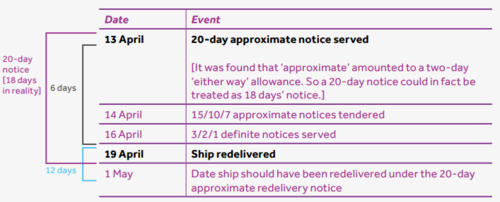Standard Club has merged with North to form NorthStandard. Find out more about NorthStandard here or continue on this site to access industry news, publications and expertise, as well as club rules and contacts.
Defence class cover - redelivery notices
News & Insights 29 June 2018
Introduction
Redelivery takes place under a time charter when the charterer’s use of the ship comes to an end and it is once again at the disposal of the owner. As there is no physical transfer of possession, an owner has to rely...
Introduction
Redelivery takes place under a time charter when the charterer’s use of the ship comes to an end and it is once again at the disposal of the owner. As there is no physical transfer of possession, an owner has to rely upon notification from the charterer that the ship has been redelivered.
Among the charterer’s obligations when redelivering a ship is the obligation to serve written notice of the expected date when the ship will be returned, known as a redelivery notice.
Redelivery notices are important because they enable an owner to plan the ship’s future employment after the present time charter has come to an end. Redelivery notices allow an owner to minimise the time between fixtures and thus attempt to maximise profit.
Service of late, or invalid, redelivery notices can have a detrimental impact upon the profitability of a ship’s planned next employment.
Example redelivery clause
Charterparties often stipulate that a number of notices are to be given by the charterer, at specified intervals, as the date for redelivery approaches. There is often provision for approximate and then definite redelivery notices to be served.
A typical redelivery clause in a time charter is:
Charterers are to give Owners not less than 20/15/10/7 approximate days’ notice of vessel’s expected date of re-delivery and 5/3/2/1 days’ definite notice.
Status of an approximate redelivery notice
In The Zenovia1 it was held by the English High Court that an approximate redelivery notice does not have contractual force and does not bind the charterer to redeliver at the date specified in the notice. Instead, such a notice is simply a good-faith estimate of the charterer’s (then) intentions for the ship and one which may be subsequently cancelled by the charterer.
To be valid, an approximate notice has to be given in good faith and on reasonable grounds. Any notice that is in any way qualified (such as notices given ‘without guarantee’, ‘all going well’ and/or ‘without prejudice’) should be treated with appropriate caution.
Failure to serve notice of redelivery
A charterer is able to successfully redeliver a ship without having tendered written notice of its intention to redeliver. In other words, service of a redelivery notice is not a pre-condition to effective redelivery. However, where a redelivery notice is not served, a charterer is likely to be in breach of the terms of its charterparty.
Impact if no notice served
If a charterer was to redeliver a ship without serving any notice of redelivery upon the owner, the accepted view is that the charterer would be in breach of the charter as at the date of redelivery for failing to go through the proper notice procedure before redelivery.
Impact if insufficient notice served
If the charterer was to give less notice than that contractually stipulated, it is likely to be in breach when it redelivers on shorter notice (prior to that point, there may also be an anticipatory breach when the short notices are issued).
In order to avoid being in breach, a charterer is under an obligation to tender notice(s) of redelivery in accordance with the terms of the charter.
Mitigation of loss
Under English law it seems that, given there is only an actual breach of the redelivery clause at the time of physical redelivery of the ship, an owner is not under any obligation to mitigate its losses at any point before the redelivery takes place.
Damages for breach
The correct measure of damages, where a charterer fails to give redelivery notice(s) in line with the subject time charter, is that which puts the owner into the same financial position it would have been in had no breach taken place. Damages for failing to give proper notice(s) of redelivery were considered in the recent case The Great Creation2. In The Great Creation, the parties actually agreed on the measure of damages, but could not agree on the method of assessing what the position should be had no breach of the charter occurred.
Facts
The ship was chartered for a period of four to five months, plus 15 days at the charterer’s option. Under the charterparty, the charterer was to give notice of redelivery as follows:
“…20/15/10/7/ days approximate and 5/3/2/1/ days definite notice…”
The charterer intended to employ the ship on a final voyage; however, due to various delays, the charterer subsequently realised this voyage would not be possible. On 13 April, a 20-day approximate notice of redelivery was served. On 14 April, the 15/10/7 approximate notices were tendered. On 16 April, the 3/2/1 definite notices were served by the charterer. On 19 April, only six days after serving the 20-day approximate notice, the ship was redelivered. The owner was able to fix the ship for a new voyage, albeit well below market rates.
Discussion
The owner argued that the correct ‘no breach’ position was the difference between the hire the owner actually received under the new charter and its estimated earnings under a notional charter had contractual redelivery notices been served.
The charterer contended that the owner’s losses were to be assessed as being the hire payable at the existing (charterparty) rate of hire for 20 days beyond the date that the 20-day notice was served.
The Court’s decision
The English High Court held that the effect of the charterer’s failure to provide accurate redelivery notices was to deprive the owner of the hire payable under the subject charter for the balance of the notice period after actual redelivery took place, i.e. the 12-day period between redelivery (19 April) and the time when redelivery should have taken place in line with the 20-day [18 days in reality] approximate notice (1 May).
Any earnings received from employment obtained in mitigation would be offset against the subject charter hire. However, because the new charter was below market rate, no such allowance was made in this instance.
Comment
While this case is fact-specific, it provides arguable authority that an owner’s claim for damages following a breach of the redelivery clause by a charterer is limited to the charter hire payable in the missing notice period. This judgment may preclude an owner from arguing for an alternative method of assessing damages.

Practical suggestions
Owner members should be cautious about relying upon approximate redelivery notices. It is suggested that shipowners do not act on approximate notices of redelivery, but instead only take active steps to fix future employment when definite notices of redelivery have been received.
Owners may wish to negotiate the terms of their charterparties to ensure that definite notices are provided as early as practicable.
Defence cover is, by its very nature, discretionary in that the club must be satisfied as to the merits and quantum of the claim in question, and the likelihood of achieving a successful outcome if it is to lend support. Essentially, the club wants to ensure that the actions proposed are appropriate, proportionate and financially viable.
Members requiring further information on this topic should direct their enquiries to their usual contact at the club.
1 IMT Shipping and Chartering GmbH v Chansung Shipping Co Ltd (‘The Zenovia’) [2009] EWHC 739 (Comm)
2 Maestro Bulk Ltd v Cosco Bulk Carrier Co Ltd (‘The Great Creation’) [2014] EWHC 3978 (Comm
The information and commentary herein are not intended to amount to legal or technical advice to any person in general or about a specific case. Every effort is made to make them accurate and up to date. However, no responsibility is assumed for their accuracy nor for the views or opinions expressed, nor for any consequence of or reliance on them. You are advised to seek specific legal or technical advice from your usual advisers about any specific matter.
The Standard Club Ltd is regulated by the Bermuda Monetary Authority.
Categories: Cover Including Discretionary Claims, Defence

